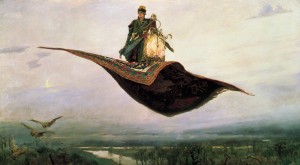 Fiction is changing but what it’s changing into isn’t something new. For a long time a sub-genre of contemporary fiction known as ‘magical realism’ provided a mind-bending literary experience to those who came across it, but sadly it sat at the fringes while traditional fantasy, science-fiction, and even thrillers enjoyed mass-market backing from readers who would no doubt have enjoyed magical realism if they knew it was available.
Fiction is changing but what it’s changing into isn’t something new. For a long time a sub-genre of contemporary fiction known as ‘magical realism’ provided a mind-bending literary experience to those who came across it, but sadly it sat at the fringes while traditional fantasy, science-fiction, and even thrillers enjoyed mass-market backing from readers who would no doubt have enjoyed magical realism if they knew it was available.
I was introduced to it by a teacher of mine (Mr Johnstone) at High School. Famous fantasy writers have been known to denounce it as a fancy way of saying you write fantasy fiction but I think there’s one very clear distinction: just as you probably wouldn’t explain the way that electricity is created and sent down power lines to power your toaster, when describing a scene in which you cook some toast, a magical realist writer feels no demand for an explanation for anything that the reader might regard as ‘magical’.
Terry Pratchett said that saying that you write magical realism is “…a polite way of saying you write fantasy and is more acceptable to certain people…”. In some regards he could be correct, fantasy fiction is certainly seen as more populist (and less literary) than magical realism. What’s more, magical realism sports a host of connections to post-modernist art and philosophy that makes it positively intellectual-sounding. However, fantasy fiction can itself be, though isn’t always, a tremendous vehicle for highlighting philosophical concepts as well. Pratchett was one of the best at doing just that.
But now, within children’s literature, we’re finding works that bridge the divide somehow. Explanations of how the magic works are left to one side as authors launch their characters straight into the adventure. Magical Realist sympathies can be especially evident in works like Pratchett’s Discworld (despite his protestations to the contrary), Garth Nix’s ‘Keys to the Kindom’ series (‘Mister Monday’ etc.), Philip Pullman’s ‘Dark Materials’, and many many more. In these books we are witness to a change in the way that magic is introduced, it is left as part of the fabric of the story with minimal exposition.
However, the exposition is still there, as it probably has to be for children. Perhaps we need to delineate fantastical elements in fiction for children. They are still getting a grasp of the reality and physics of their own world so it seems prudent to provide some explanation as to how things work in an alternate one. What’s more the explanation of the magic can itself often serve as a component of the plot.
I’m in this boat. Jack starts in our world (or something very much like it) and is exposed to things he doesn’t understand, therefore a necessary part of the plot (and his character development) involves him gaining a basic idea about how the magic works.
There are things that I’ve left to one side for now and things that may never be explained but I’m happy to admit that there’s simply too much explanation of the magic in my books for anyone to call it ‘magical realism’. While I still enjoy and respect the genre and can see how it really can work in children’s literature I can’t help slipping into fantasy
For me part of the fun of our world is to be found in finding out things. I couldn’t limit my characters by not allowing them to discover the ‘secrets’ behind the magic any more than I could answer my children with the ever-unsatisfying ‘just because’. For a child I expect that a truly magical realist work of fiction could prove equally intellectually unsatisfying, perhaps its one of these odd cases where a literary genre simply doesn’t scale well into a children’s version.
The books I’ve described above have no doubt been enjoyed by more adults and teens than children of twelve and under, they certainly rank extremely highly within my list of favourite books. However, for children reading what’s known as ‘middle grade fiction’ (more about it here) and those younger than them, I can’t help but feel that authors need to be ready for the ‘why’s and ‘how’s from their readers.
What genre of books do you think would/does translate well into ‘children’s’ versions? Which genre’s simple don’t translate at all? Am I wrong about the books listed above, do you think that children between eight and twelve enjoy them as much as teenagers? As always thanks for reading and don’t forget you can buy a copy (paperback or kindle edition) of ‘Jack Reusen and the Fey Flame’ over on this page.
